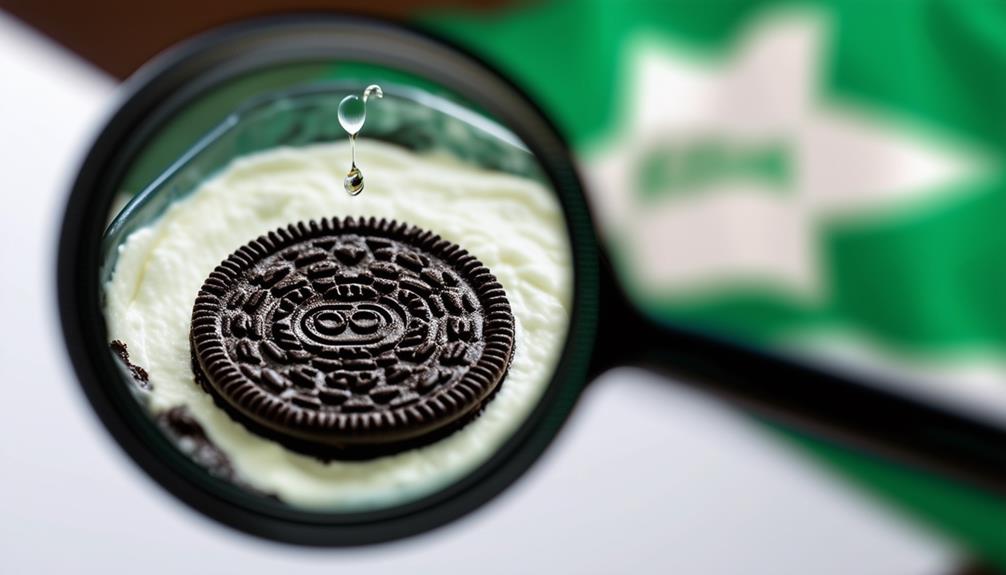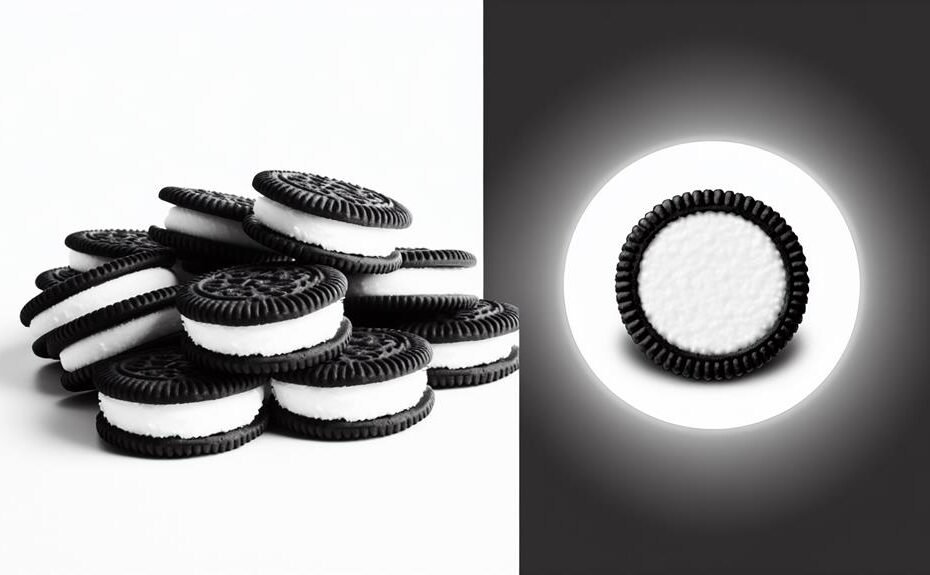You've probably wondered if Oreos, the classic favorite, are vegan-friendly. And the answer might surprise you – at the outset, yes, Oreos seem to be free from animal-derived ingredients. The creme filling is plant-based, and the cookies themselves are made with plant-based fat. But, as you delve deeper, some concerns arise. Sugar processing, for instance, might involve bone char, making some vegans hesitant. So, are Oreos truly vegan? You'll want to investigate the nuances of Oreo's ingredients and production process to find out.
Oreo's Vegan Roots Explored
As you investigate the history of Oreos, you'll discover that the beloved cookie underwent a significant transformation in 1998, when the company replaced lard with a plant-based fat, inadvertently making the treats suitable for vegan diets. This change in ingredients marked a turning point in Oreos' history, making them a surprisingly vegan-friendly option.
When you verify the ingredients list, you'll find that Oreos are made with vegan-friendly components like sugar, flour, oils, cocoa, leavening agents, and soy lecithin. The creme filling, often a concern for vegans, is also free from dairy or animal products. While some vegans may still choose to avoid Oreos due to potential cross-contact with milk during production, the absence of animal-derived ingredients makes them a viable option for many.
Sugar Content Raises Concern
As you assess the vegan status of Oreos, you'll want to examine the sugar content, which raises concerns due to the potential use of bone char in processing. This byproduct of animal agriculture can be a sticking point for some vegans, even if it's a common practice in the industry.
Now, let's investigate how this issue affects Oreos, given their many flavor options and unbleached enriched flour base.
Oreo's Many Flavor Options
As you delve into the world of Oreos, you'll find that the classic cream-filled cookie comes in a surprising array of flavors. From Original Flavor to Mint Chocolate Chip and Pumpkin Spice, each variety offers a unique twist on the classic recipe.
But with so many flavors to choose from, it's important to examine the ingredients and nutritional content of each to make sure they align with your dietary needs.
- Original Flavor Oreos
- Mint Chocolate Chip Oreos
- Pumpkin Spice Oreos
- Limited-edition seasonal flavors
Original Flavor Oreos
You'll be relieved to know that original flavor Oreos don't contain any animal-derived ingredients, making them a suitable snack for those following a vegan diet.
However, the sugar content in original Oreos raises concerns for those monitoring their sugar intake.
Since Oreos don't contain cream, you can indulge in these classic treats without worrying about non-vegan ingredients.
Mint Chocolate Chip Oreos
Mint Chocolate Chip Oreos provide a revitalizing twist on the classic Oreo flavor, blending the coolness of mint with the richness of chocolate, and are a popular vegan flavor option. However, the sugar content in these Oreos may raise concerns for some consumers. Check out the nutritional facts below:
| Oreo Flavor | Sugar Content |
|---|---|
| Mint Chocolate Chip | 17g per serving |
| Classic Oreo | 14g per serving |
| Strawberry Oreo | 19g per serving
Pumpkin Spice Oreos
Variety is the spice of life, and Oreo's seasonal Pumpkin Spice flavor adds a warm twist to the classic cookie.
But its high sugar content may leave a sour taste in your mouth.
As one of Oreo's many seasonal flavors, Pumpkin Spice Oreos cater to diverse taste preferences.
But be aware of the high sugar content that comes with this sweet treat.
Unbleached Enriched Flour Base
As you investigate the ingredients of Oreos, you'll notice that the unbleached enriched flour base is a key component that raises some concerns. The sugar content, in particular, might give you pause, especially if you're watching your sugar intake.
Let's take a closer look at the points that make up this base, including:
- Canola Oil Incorporation
- Cocoa Processed With Alkali
- Soy Lecithin Emulsifier
Canola Oil Addition
You might be surprised to learn that canola oil, a plant-based ingredient, is a key component in Oreos, which helps to alleviate concerns about animal-derived oils.
As a vegan, you'll be relieved to see canola oil on the ingredients list, providing a source of fat without using animal products.
This inclusion contributes to Oreos' signature texture and flavor.
Cocoa Processed With Alkali
While canola oil helps to alleviate concerns about animal-derived oils, the cocoa processed with alkali in Oreos may raise different concerns for some vegans due to its potential sugar content. This processed cocoa boosts the flavor in Oreos, but the added sugar might be a turn-off for some.
| Component | Purpose | Impact on Oreos |
|---|---|---|
| Cocoa Processed with Alkali | Improves flavor | Adds sweetness and reduces bitterness |
| Unbleached Enriched Flour | Provides structure and texture | Forms the foundation of Oreo cookies |
| Sugar Content | Adds sweetness | Contributes to taste profile |
| Combination of both | Vital components | Appeals to a wide range of consumers, including vegans |
Soy Lecithin Emulsifier
Soy lecithin, a common emulsifier in processed foods, plays a crucial role in Oreos by binding ingredients together, but its presence doesn't eliminate concerns about the sugar content in these iconic cookies.
While savoring your Oreos, keep in mind that soy lecithin helps maintain the consistency of the creme filling, but it's the sugar content that's a bigger concern.
Glycerin Raises Vegan Concerns

Now that you've pondered the sugar content in Oreos, it's time to shift your attention to another potential concern: glycerin.
You might be wondering if the glycerin in Oreos is vegan-friendly, and the answer is a bit complicated. As you delve into this ingredient, you'll need to take into account the sources of glycerin and how they impact its vegan status.
Honey in Some Flavors
You're about to uncover some surprising ingredients in Oreos that might make you think twice about their vegan status. As you delve into the world of Oreos, you'll find that some flavors contain honey, which is a no-go for strict vegans.
Now, let's take a closer look at some more ingredients that raise vegan concerns.
1. Carmine-Derived Red Food Dye
2. L-Cysteine Derived From Duck
3. Confectioner's Glaze From Insects
4. (And, of course, honey and glycerin)
Carmine-Derived Red Food Dye
Occasionally, some Oreo flavors may incorporate carmine-derived red food dye, which can be a deal-breaker for vegans who actively avoid animal-derived ingredients.
You should also be aware that glycerin, found in Oreos, can raise concerns, and certain flavors may contain honey, which isn't vegan.
Always check the ingredients of specific Oreo flavors for non-vegan components like carmine or honey.
L-Cysteine Derived From Duck
As you investigate the ingredients of Oreos, you'll find that L-cysteine, an amino acid derived from duck feathers, is used in some flavors, sparking concerns among vegans.
This animal-derived ingredient raises questions about the vegan status of certain Oreo flavors.
Furthermore, some flavors may contain honey, another non-vegan ingredient, making it crucial for vegans to carefully check the ingredients list.
Confectioner's Glaze From Insects
Confectioner's glaze, a shiny coating often used in some Oreo flavors, is actually derived from the secretions of the lac bug, raising vegan concerns. You might be surprised to find that glycerin and honey can also be non-vegan ingredients in some Oreos. Be cautious when selecting flavors to make sure they align with your vegan lifestyle.
| Ingredient | Derived From | Vegan Status |
|---|---|---|
| Confectioner's Glaze | Lac bug secretions | Non-Vegan |
| Glycerin | Animal fats (sometimes) | Potentially Non-Vegan |
| Honey | Bee exploitation | Non-Vegan |
| Other Oreo Ingredients | Plant-based | Vegan |
L-Cysteine From Duck Feathers
When you examine the ingredients of Oreos, you'll find that L-Cysteine, an amino acid, and glycerin, a common additive, can raise concerns for vegans due to their potential animal-derived origins. But that's not all – other ingredients like Whey-Derived Lactose, Gelatin in Marshmallow Creme, Bone Char-Filtered Sugar, and Glycerol Ester of Wood Rosin also warrant attention.
Let's take a closer look at these points to determine their impact on Oreo's vegan status.
- Whey-Derived Lactose
- Gelatin in Marshmallow Creme
- Bone Char-Filtered Sugar
- Glycerol Ester of Wood Rosin
Whey-Derived Lactose
Whey-derived lactose, a dairy byproduct, slips into some Oreo flavors, sparking concern among vegans who scrutinize every ingredient.
You should be aware that glycerin, often used in Oreo products, can be derived from animal sources, and L-Cysteine, sourced from duck feathers, is another non-vegan ingredient to watch out for.
These components can make certain Oreo varieties non-vegan.
Gelatin in Marshmallow Creme
You'll want to scrutinize the ingredients in marshmallow creme, another potential Oreo component that raises vegan concerns, especially regarding gelatin, glycerin, and L-Cysteine.
As a vegan, you know that Oreos containing animal products, like gelatin, aren't an option. Even some vegan butter alternatives may contain these non-vegan ingredients, making it important to check labels carefully.
Bone Char-Filtered Sugar
When you scrutinize the ingredients list, you may be surprised to find that some sugar in Oreos is filtered through bone char, a process that raises vegan concerns due to its use of animal-derived products.
This bone char-filtered sugar, along with glycerin and L-cysteine, are ingredients that may prompt vegan concerns.
Always check ingredient labels to make informed choices.
Glycerol Ester of Wood Rosin
Some Oreo products contain Glycerol Ester of Wood Rosin, a food additive that may raise vegan concerns due to its potential animal-derived sources. As a vegan, you should be cautious when consuming products with this additive. Always verify the ingredient labels to make sure the product aligns with your dietary choices.
| Additive | Potential Source | Vegan Concerns |
|---|---|---|
| Glycerol Ester of Wood Rosin | Animal-derived | Yes |
| L-Cysteine | Duck feathers | Yes |
| Sugar | Bone char filtration | Yes |
| Other additives | Varying sources | Varying concerns |
Remember to always inspect ingredient labels to confirm the product aligns with your dietary choices.
Vegan Oreos: A Paradox
Considering the presence of vegan-friendly ingredients, it's ironic that Oreos' vegan status is still a topic of debate. You'd think it's a no-brainer, but the truth is, Oreos are accidentally vegan, not specifically formulated as a vegan treat.
The absence of milk, eggs, or other animal-derived products in Oreos makes them suitable for a vegan diet. You can check the ingredients yourself – they contain plant-derived goodies like unbleached enriched flour, palm oil, and cocoa.
However, some vegans may still avoid Oreos due to potential cross-contamination with milk during production. The official statement from the company advises checking allergen advice for potential cross-contaminants with milk.
Conclusion
So, are Oreos vegan?
The answer is yes, but with some caveats. While Oreos don't contain dairy or animal products, there's a risk of cross-contamination with milk during production. Moreover, some vegans might avoid Oreos due to concerns about bone char in sugar processing or glycerin sourcing.
However, for many vegans, Oreos are a suitable treat. Just remember to make an informed decision based on your personal values and dietary needs.
